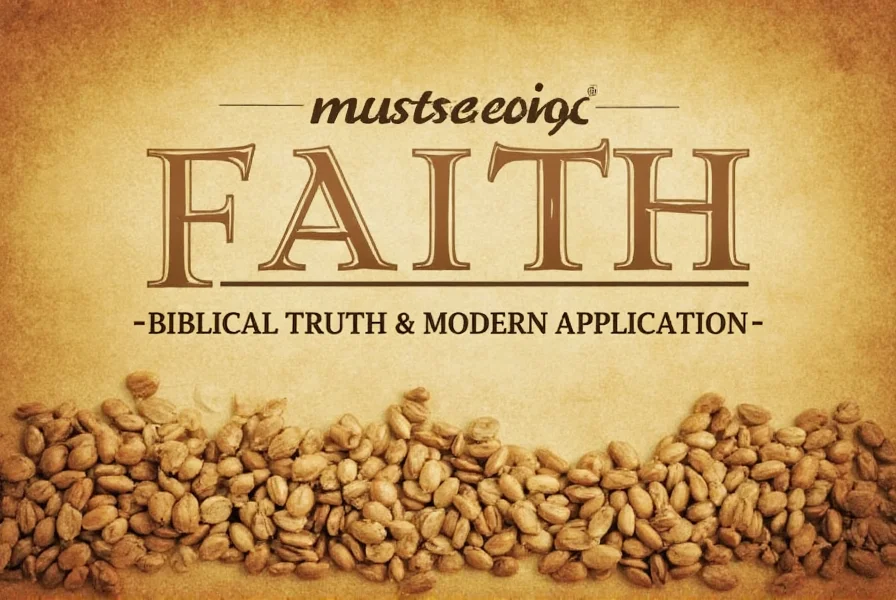The mustard seed metaphor appears in two key biblical passages: Matthew 17:20 and Luke 17:6. In both accounts, Jesus uses this tiny seed to illustrate a profound spiritual principle about the nature of faith. When His disciples struggled to heal a boy with seizures, Jesus explained their failure stemmed not from insufficient faith quantity but from misplaced faith quality. This distinction remains critically relevant for modern believers navigating challenges.
Biblical Context of the Mustard Seed Reference
In first-century Palestine, the mustard seed represented the smallest measurable entity. Gardeners recognized sinapis nigra (black mustard) as producing minuscule seeds—about 1-2 millimeters in diameter—that grew into substantial shrubs reaching 8-10 feet tall. Jesus leveraged this common agricultural knowledge to make His point unforgettable. The contrast between the seed’s microscopic size and the plant’s impressive growth perfectly illustrated how authentic faith operates.
When Jesus said “if you have faith as small as a mustard seed,” He wasn’t prescribing a specific faith measurement. Rather, He highlighted faith’s essential quality. The Greek text uses kloumbaria, meaning “a tiny amount,” emphasizing authenticity over volume. This corrects the common misconception that Christians must “generate more faith” through willpower. True mustard seed faith depends entirely on the object of faith—God Himself—not the faith’s size.
| Biblical Reference | Original Greek Phrase | Key Emphasis |
|---|---|---|
| Matthew 17:20 | κλουμβάρια μεν σινάπεως | Faith’s effectiveness depends on its authenticity, not quantity |
| Luke 17:6 | κλουμβάρια μεν σινάπεως | Faith connects believers to God’s power, enabling impossible tasks |
Common Misinterpretations of Mustard Seed Faith
Many believers misunderstand this teaching, leading to spiritual frustration. Three prevalent misconceptions require correction:
- “More faith equals better results” fallacy – People often believe they need “more faith” to see breakthroughs. Jesus actually condemned this mindset when He rebuked His disciples for “little faith” (oligopistia), meaning “faith focused on circumstances rather than Christ.”
- Prosperity gospel distortion – Some teachers claim mustard seed faith guarantees material blessings. This ignores Jesus’ context: healing a suffering child, not acquiring wealth. The “mountains” refer to obstacles blocking God’s purposes, not personal desires.
- Magic formula mentality – Treating faith as a spiritual lever to manipulate God contradicts the passage’s essence. Authentic mustard seed faith submits to God’s will, as Jesus modeled in Gethsemane (Matthew 26:39).

Practical Application for Modern Believers
Understanding the mustard seed principle transforms how we approach challenges. When facing seemingly insurmountable difficulties, consider these practical applications of genuine mustard seed faith:
- Focus on God’s character, not your circumstances – The disciples watched Jesus heal countless people yet doubted His power in this instance (Matthew 17:19). Authentic faith remembers God’s past faithfulness regardless of present difficulties.
- Embrace dependent prayer – Jesus immediately followed His teaching with the boy’s healing through prayer (Matthew 17:21). Mustard seed faith manifests in persistent, humble prayer acknowledging our need for God’s intervention.
- Act on biblical promises – True mustard seed faith isn’t passive hope but active trust demonstrated through obedience. Like the mustard seed that must be planted to grow, faith requires action aligned with God’s Word.
Consider the story of George Mueller, a 19th-century minister who cared for over 10,000 orphans through faith-based reliance on God. When food ran out, he didn’t panic but thanked God for provision—and meals arrived miraculously. Mueller didn’t claim “mountain-moving faith” but practiced mustard seed faith: trusting God’s character when circumstances seemed impossible.
Cultivating Authentic Mustard Seed Faith
Genuine faith grows through specific spiritual practices. Rather than striving for “more faith,” focus on these faith-nurturing disciplines:
- Immerse in Scripture – Romans 10:17 states “faith comes from hearing the message.” Regular Bible engagement builds accurate understanding of God’s nature and promises.
- Practice situational surrender – Start applying mustard seed faith to small daily challenges. Each act of trusting God in minor matters prepares you for greater challenges.
- Join faith-filled community – Hebrews 10:24-25 emphasizes mutual encouragement. Surrounding yourself with believers who model authentic faith strengthens your own mustard seed trust.

The mustard seed principle ultimately redirects our focus from self-effort to God’s power. When Peter walked on water (Matthew 14:29), his initial steps demonstrated mustard seed faith—until he shifted focus to circumstances. Like Peter, we succeed not through faith quantity but through faith quality: keeping our eyes fixed on Jesus (Hebrews 12:2). This biblical concept remains one of Christianity’s most liberating truths—God honors even the smallest authentic trust in Him.











 浙公网安备
33010002000092号
浙公网安备
33010002000092号 浙B2-20120091-4
浙B2-20120091-4